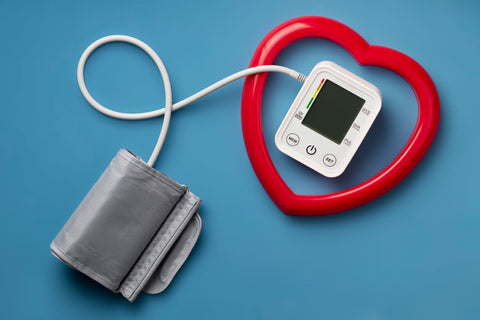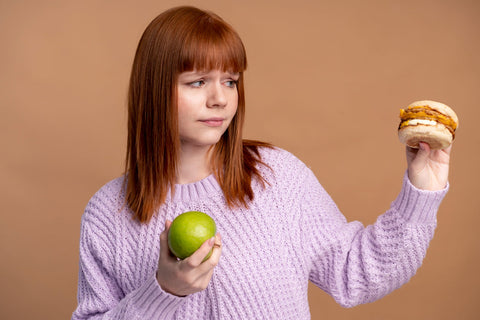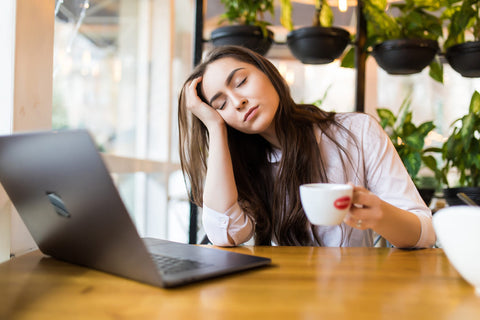A normal blood pressure reading is typically considered to be around 120/80 mm Hg (millimetres of mercury). Hypotension is when a person's blood pressure reading is consistently below 90/60 mm Hg.
Symptoms of low BP may include dizziness, fainting, blurred vision, nausea, fatigue, difficulty concentrating, rapid or shallow breathing and cold, clammy skin.
If a person experiences these symptoms or has consistently low blood pressure readings, it's essential to consult a healthcare professional for proper evaluation and management.
They can determine if the low BP is causing any health issues or if it is linked to an underlying condition.
Is Low Blood Pressure A Consequence of Not Eating Enough?
Not eating enough can potentially cause low BP, as it can lead to a significant decrease in overall blood volume or affect the body's ability to maintain fluid and electrolyte balance.
When you don't eat enough, your body may not receive an adequate amount of essential nutrients, including salts and fluids that are crucial for maintaining proper blood pressure levels.
Low BP, or hypotension, may be caused by dehydration or insufficient intake of vital nutrients like Sodium, which plays a role in regulating blood pressure.
Additionally, inadequate food intake can lead to a drop in blood sugar levels (hypoglycemia), which can cause symptoms such as dizziness, weakness and in severe cases, fainting or low blood pressure.
Eating more in itself might not directly raise your BP. However, the type and amount of food you consume can help maintain a healthy blood pressure range.
Eating a meal can cause a temporary increase in blood pressure. When you eat, your body directs more blood to the digestive system, causing a slight rise in blood pressure.
However, this increase is generally temporary and should return to normal levels after digestion.
If you consume foods high in Sodium (salt), your body might retain more water, leading to increased blood volume, which could raise blood pressure temporarily.
Additionally, if you have an underlying condition that is affected by Sodium intake, such as hypertension (high blood pressure) or certain kidney diseases, a high-Sodium diet might contribute to higher BP.

What Causes Low Blood Pressure?
Low BP, or hypotension, can be caused by various factors, including dehydration, inadequate fluid intake, excessive sweating, diarrhoea, vomiting, or fever.
Certain medications, such as some used to treat high BP, heart conditions, depression and other health issues, can lower blood pressure as a side effect.
Conditions like extremely low heart rate (bradycardia), heart valve problems, heart attack, or heart failure can lead to low blood pressure.
Disorders such as adrenal insufficiency (Addison's disease), hypothyroidism, low blood sugar (hypoglycaemia) and diabetes can cause low BP.
Bacterial infection in the bloodstream can lead to a life-threatening drop in blood pressure known as septic shock.
Severe allergic reactions can cause a sudden drop in BP, leading to shock.
Disorders like Parkinson's disease, multiple system atrophy, and other nervous system disorders can disrupt the body's normal blood pressure regulation.
Lack of essential nutrients, especially electrolytes like Sodium and Potassium, can lead to low BP.
Some women might experience a temporary drop in BP during the first or second trimester.
Some individuals may have a genetic predisposition to low BP. Sometimes, low BP may not cause any noticeable symptoms.
How Can I Raise My Blood Pressure?
Some methods to temporarily increase blood pressure include:
-
Fluid and salt intake: Drinking fluids and consuming slightly more salt (under medical guidance) can help increase blood volume, thereby raising blood pressure.
-
Wear compression stockings: Compression stockings or abdominal binders can help prevent blood from pooling in the legs and assist in maintaining blood pressure.
-
Physical activity: Engaging in physical movement, particularly moving from a lying or sitting position to standing slowly, can prevent a sudden drop in blood pressure.
-
Dietary changes: Eating small, low-carbohydrate meals several times a day can prevent a sudden drop in BP after eating. Minimising alcohol can also help stabilise blood pressure.
-
Medication adjustments: If medications are causing low BP, adjusting dosages or changing medications, under medical supervision may help.
Long-term strategies to manage low BP depend on the underlying cause and might involve lifestyle changes, medication adjustments, or targeted treatments.
What Supplements Can I Take for Low Blood Pressure?

Here are some supplements and dietary considerations that might be discussed with a healthcare provider to manage low BP:
-
Iron: Low iron levels (anaemia) can cause low BP. Iron supplements or iron-rich foods might be suggested if anaemia is the cause of low BP.
-
Vitamin B12: Deficiency in vitamin B12 can sometimes lead to anaemia, potentially causing low BP. Supplements or B12-rich foods may be recommended.
-
Caffeine: Caffeine, found in coffee or tea, can temporarily raise BP. However, its effects vary among individuals and should be consumed in moderation.
-
Blood Pressure Medications (Fludrocortisone): This is a medication that can help raise blood pressure by promoting salt and fluid retention. It's prescribed in specific cases of low BP.
Supplements should be used cautiously and under professional guidance, as excessive intake can have adverse effects or interact with other medications or conditions.
Related Articles
Sources
- Low Blood Pressure Diet: Tips to Increase Blood Pressure (healthline.com)
- Low Blood Pressure (Hypotension): Causes, Symptoms, & More (healthline.com)
- Low Blood Pressure Symptoms: How to Raise, Causes, and More (healthline.com)
- Low blood pressure (hypotension) - Symptoms and causes - Mayo Clinic
- Low blood pressure (hypotension) - Diagnosis and treatment - Mayo Clinic
- Smoke-free policies associated with lower blood pressure | ScienceDaily
- Mindfulness-based stress reduction helps lower blood pressure, study finds | ScienceDaily
Images: by Freepik, Image by xb100 on Freepik, Image by Freepik
Any information or product suggested on this website is not intended to diagnose, treat, cure, or prevent any medical condition. Never disregard medical advice or delay in seeking it because of something you have read on this website. Consult your primary healthcare physician before using any supplements or making any changes to your regime.




